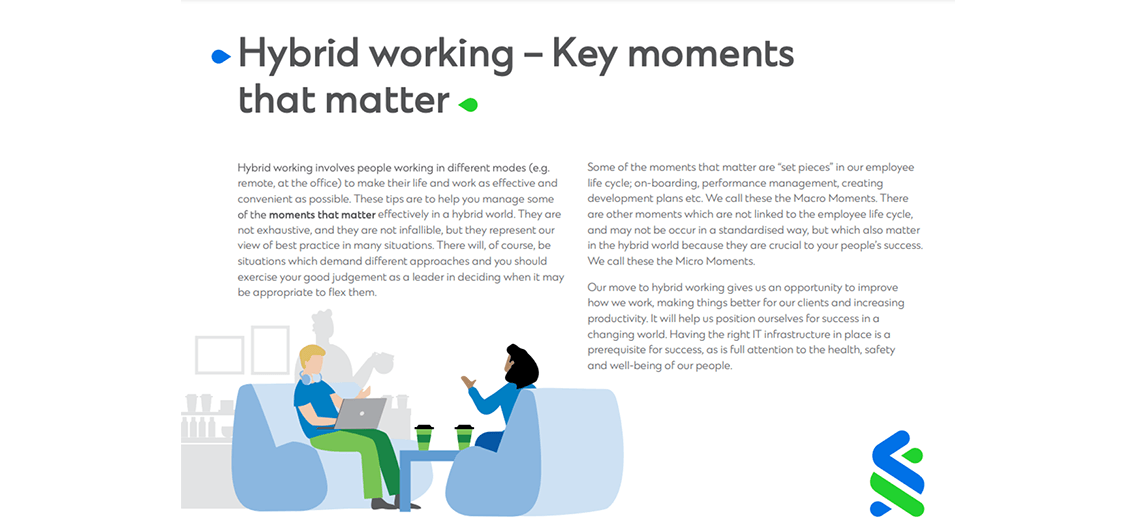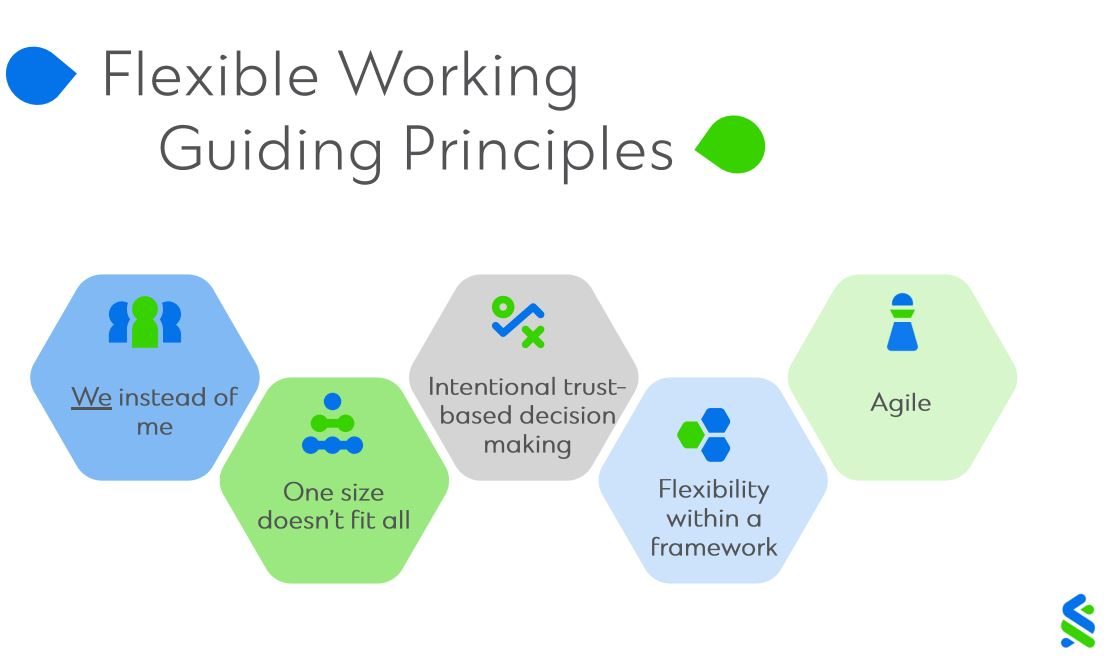-

Working here
Flexible working
When you work with us, you can combine home and office-based working
Have greater flexibility in your working patterns and locations
At Standard Chartered, we believe flexible working isn’t just about when and where you work, it’s also about how and why you work, and what you’re working on. Our flexible working approach is designed to balance business needs with supporting individual wellbeing to enable high performance in a sustainable way.
Our colleagues discuss their flexible work arrangements regularly with their People Leader, to ensure they continue to be fit for purpose and take into account changing work or life circumstances.

Our flexible working options
Over the last few years, we have really seen the benefits of flexible working and our people tell us it’s one of the reasons they join and stay with us. When you work with us, you have the autonomy to choose your ways of working: combining flexibility in working time, patterns, and location – with agreement from your People Leader.
This allows you to balance business, client and team needs with enough time set aside to come together to collaborate, innovate and connect. At the same time, the flexibility provides support for you and your personal responsibilities and priorities, or just things you love doing outside and around work.

For example, a team may have a project kicking off and agree to come together more often in the office to work collaboratively in the same space. Or if a new member joins the team, agree to come in to spend more time in person with the new joiner individually and as a team to assist them with their integration into the Bank and ongoing learning.
But if an individual has deep, focussed work to do they can agree with their People Leader to work from home for the time required.
Is Standard Chartered committed to offering flexible working?
The return-to-office debate has found a new lease of life over the last year, with some companies doing a full U-turn on their pandemic era flexible working policies. Our industry is one that has, in many cases, mandated workers back into the office for some or all of the working week, justified on the basis of increasing productivity, creating a more inclusive culture and nurturing collaboration.
However, much of the existing research shows that flexible working in fact boosts productivity, and here at Standard Chartered, it is here to stay. In 2020 when we first launched flexible working, colleagues in just eight markets discussed with their People Leaders how to combine time working in the office with time working remotely and agreed on a fixed number of days in each location. Today we have 52,000 colleagues in 42 markets on agreed flexible working arrangements, and it has become a big part of who we are and how we operate.
Is flexible working offered across all markets?
We think about our colleagues as a stakeholder group in the same way we think about customers, investors, and shareholders. We engage with them regularly on issues they feel passionately about and try not to impose a one size fits all approach to work policies. When we first adopted flexible working, some of our markets said that it was a very western concept and would not work in their respective regions, due to local customs and their work cultures. However, when we surveyed our employees, we found that there was clear appetite for it, and now people work significantly different patterns across our different markets, ranging from working from home 36% of the time in the UAE, to working from home 75% of the time in Poland.
Where roles and regulations allow for it, we offer colleagues options and combinations to structure the location and pattern of their work (days and hours) in a way that works for their role, their teams, and their personal life, whilst satisfying client needs and our business objectives.
Who’s eligible for flexible working?
Flexible working options are available to most colleagues but there may be roles and markets where elements of flexibility are not possible (e.g., for roles that are undertaken in a branch). Whether a role can be done flexibly will always be the starting point of the conversation and we will clearly articulate those roles which require a physical presence in a branch and/or office, and/or fixed hours.
We welcome the opportunity to talk through your preferences as part of the recruitment process.
There is no minimum length of service required to make a flexible working request. Specific details of your flexible working arrangement would need to be discussed with your People Leader and consideration will also be given based on your personal circumstances and the requirements of your role. Formal flexible working options are not available to non-employed workers.
Are there times employees can’t work flexibly?
Alongside the flexibility to structure work in a way that supports colleague needs, there will be times when colleagues working flexibly may be required to attend a branch, office, or other business location even where such attendance falls outside the colleague’s normal flexible working pattern. For example:
- Business events or trips
- Client meetings
- Training (if not using virtual platforms)
Where possible, reasonable notice is given, to help you manage your commitments.
How is a flexible working arrangement agreed and approved?
An agreed flexible working pattern is a result of a two-way conversation between an employee and their People Leader. Your People Leader will consider your individual needs, the needs of the business, client, your team, your health and safety, and if there are any potential risks or negative impacts on the Bank.
The way we work is in support to us achieving our goals and enabling you to bring the best version of yourself to work. When goals or work requirements change, you should re-visit your flexible working arrangement with your People Leader and discuss if a change to your flexible working arrangement is needed. The same applies if you are at a major milestone in your life (e.g., welcoming a new addition to the family).
At the very least, your People Leader will discuss your flexible working arrangement with you and your team once a year.
The role of the People Leader
Everyone who works in SC has a People Leader. Being a People Leader is an important leadership role in our organisational design. They are there to lead your team, as well as role model our valued behaviours, which shapes our employee experience and our culture. Their role includes:
- Leading by example, reinforcing our position towards greater flexibility as an organisation
- Having open and inclusive conversations with individuals and teams. People Leaders must recognise and treat each colleague as a unique individual with their own needs and aspirations whilst taking into consideration and balancing the wider team needs.
People Leaders play a key role in balancing the flexible working requests and arrangements of their teams with business needs. Flexible working discussions should take place at least once a year, or when work or life circumstances change.
Opportunities for development and promotion are not affected by whether an individual works flexibly.

Rewards and benefits
In line with our Fair Pay Charter, we offer competitive salary and benefits that support your mental, physical, financial and social wellbeing.

Wellbeing
Our purpose is to drive commerce and prosperity through our unique diversity – this is underpinned by our brand promise, here for good.

